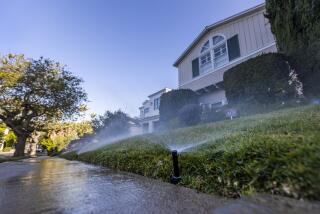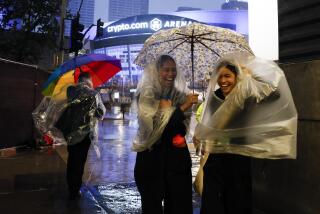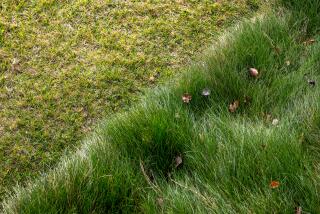There’s no drought of rebukes, lectures and guilt
I don’t have crops at stake or a well that needs replenishing, but that doesn’t diminish the glee I felt when I woke up in the middle of the night last weekend to the sound of rain pounding my roof and soaking my parched yard.
I know it’s just a drop in the bucket — a near-empty bucket in our drought-stricken state. But I wanted to celebrate: to run outside as I had as a kid, when we’d greet the season’s first snowfall with heads back and mouths open, catching snowflakes on our tongues.
That was before acid rain and global warming and all the other man-made calamities that have soured our relationship with nature.
Last weekend’s rain didn’t last long; in my neighborhood it was gone before dawn. But the brief wet respite reconnected me to a time when we could afford to be naive — when having a lush green lawn didn’t make you a bad citizen and taking a long shower wasn’t a crime.
I don’t mean to make light of our water shortage or our civic duty to conserve. I just don’t like feeling guilty every time I turn on a spigot, or being scolded by zealots who want to shame me for having a swimming pool.
::
Deidra Walpole is one of those zealots “and proud of it,” she said. She considers frontyards like mine “anachronistic oases of ignorance.”
Haven’t we been paying attention to “repeated dire warnings in the media about an epic catastrophic drought”?
Yes, we have — and it’s that kind of overheated language that makes us want to tune those warnings out.
Walpole has been gardening organically for almost 40 years, first on a half-acre against a creek in Topanga and for the last 13 years in the tree-filled yard of a cottage south of Ventura Boulevard in Woodland Hills. “I think I’m really cutting-edge in my neighborhood,” she said.
She and husband Bruce Wright have transformed the yard, pulling up the lawn and putting in low-maintenance trees and drought-tolerant beds and creating an arroyo to funnel rainwater where it’s needed most. “We’re going for zero runoff from the property,” Walpole said.
Not only is the new landscape saving water, it is going to net the couple a $2,000 rebate under a turf removal program offered by local water districts.
Walpole said she and Wright are avid hikers and science geeks: “We’ve been to the source of every drop of water … and studied the engineering that brought that water down the delta to Southern California.”
Wright teaches science at an elementary school in Woodland Hills. His fifth-graders are learning to protect the Earth’s ecosystem — and his wife is not above using those kids to guilt-trip the rest of us.
“Every drop of water you put on your lawn thumbs its nose at those children and their children,” Walpole declared in an email to neighbors working on a local park project.
And it’s not just the water in our sprinkler systems that’s thumbing its nose at 10-year-olds and their unborn offspring: “Every drop you waste with every flush, every time you let the water run, every time you run a half-full washer load tells those children that they don’t matter.”
::
This isn’t the first time Walpole has gotten worked up about my environmental profligacy. She chided me last spring after I wrote about being annoyed by the inconvenience of the city’s plastic bag ban.
“Dismay does not adequately convey what I felt reading your essay,” she wrote then. “I felt hopeless. As my husband said, sadly shaking his head after reading it, ‘We have such a long way to go.’”
Fortunately I have evolved — after spending a small fortune on reusable bags.
And thankfully, Walpole is less strident over the phone than her emails let on. “It’s an interesting time,” she said. “We’re in so much transition. I’m just trying to do my part.”
She just seems to care so deeply, she can’t help but proselytize. She even carries a piece of chalk on neighborhood walks so she can write notes to anyone who has water running onto the sidewalk.
I applaud her enthusiasm, but I think that would bother me. I feel pressure enough just walking past the brown lawns in my neighborhood. What used to be a symbol of neglect now gets rewarded with a rebate check. And I’m afraid to water my roses, worried about what the neighbors might think.
Twitter: @SandyBanksLAT
Details on the rebate program are available online.
More to Read
Start your day right
Sign up for Essential California for news, features and recommendations from the L.A. Times and beyond in your inbox six days a week.
You may occasionally receive promotional content from the Los Angeles Times.






